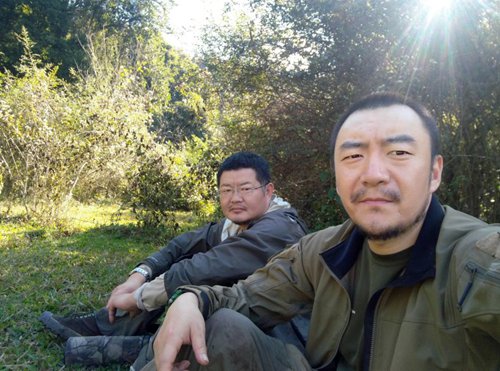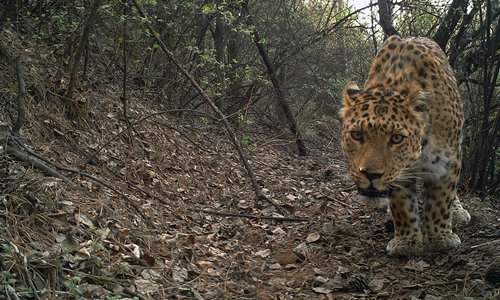
Song Dazhao (front) and friend Photo: Courtesy of Song Dazhao
Living in Beijing but engaged in protecting leopards in the distant Taihang Mountains of Shanxi Province, Song Dazhao travels to and fro frequently. Over the past 10 years, the man has been devoted to the protection of the North China leopard (Panthera pardus orientalis), an endangered wild cat native to northern China.
Song, who previously worked in the internet industry in Beijing with a handsome income, altered his life course after he went to Shanxi as a volunteer for leopard protection. Following several years of investigation and exploration, in 2012 Song made up his mind to do the job full time and later established an alliance for wild cat protection.
His group has installed over 80 cameras in the mountains and has organized local volunteers to assist in their work.
Throughout the years, some local farmers who previously found Song's job beyond understanding have changed their attitudes following Song's persistent efforts and publicity, gradually realizing the importance of protection.
"They [leopards] don't take humans as prey. And they are so rare that you couldn't easily run into them, so there is no danger at all," Song responded to the question of his safety on the job.

An adult North China leopard prowls the Taihang Mountains of Shanxi Province. Photo: Courtesy of Song Dazhao
Into the mountains
Song nicknamed himself "big cat" to show his love for leopards. It is this sheer love that keeps driving him forward in the path of protection.
The 42-year-old was born in Gansu Province and had heard many stories growing up about the animals of the Qinling Mountains, like how a black bear hid between the stones and how a hunter ran into a leopard.
After graduating from university in 1997, Song worked in the internet sector. But after several years, Song felt his job was dull and meaningless. Even though he earned a considerably high income, he "did not know what he is working for."
Watching birds on a piece of uncultivated land in Beijing, which he passed by on his way to work every day, became his only source of fun. Usually he set off one hour earlier every morning just to watch the birds and cheer himself up before his dreary day in front of a computer.
The turning point of his life came in 2008, when he met Wang Buping, a leading figure in the protection of leopards who had devoted all his time, energy and money for their protection.
Impressed, Song followed Wang, who died in 2015, into the mountains as a volunteer. This experience changed his life and opened up another world. He realized that he could live like Wang, doing something meaningful and making a difference.
In 2012, when Wang's savings had run out and he needed someone to take over his job, Song faced a hard choice between going back to work as usual or abandoning his current mode of life to do protection full time. In the end, he followed his heart.
"Many asked me if my family support my choice. Without their support, I would not have gone so far," Song told the Global Times.
Carrying forward protection
There is no official figure on the number of North China leopards yet. The species is so rare that locals even ask: "Do we really have leopards here?"
Song built an alliance in 2013 and enticed several friends with the same ideals to join him. They are now conducting basic research about the condition and number of the leopards, evaluation work about the habitat, identifying potential dangers as well as doing whatever else they can to improve the environment for the leopards.
One important job is to install cameras in the wild to trace their whereabouts. They have installed more than 80 cameras in the mountains. To make their job easier, they also employ local farmers to patrol the mountains, change batteries and swap SD cards regularly.
The most thrilling moment for the team, of course, is to check for pictures of leopards caught on camera. Between 2013 and 2017, the team has shot photos of 16 adult leopards along with their kittens. The actual number must be bigger, Song revealed.
One of Song's goals is to protect the fruits of Wang's previous efforts in this area. "It remains a daunting task," he said, adding that he believes that the best thing to do is maintain the current environment and prevent destruction, so that the leopards will follow their natural course to breed.
Mobilizing locals
In cultivating a friendly environment for the leopards, one extremely vital job for Song is to get local farmers engaged and involved.
"Unlike Panthera pardus, which have special protection zones, the problem for North China leopards is the lack of habitat. Now they mainly live in populous areas, and if they want to survive they need to get along well with the humans," said Song, stressing that the key is to ease their conflicts with humans.
As Song explained, in the past, farmers herded their cattle into the mountains, which in turn scared off small animals like roe deer, a staple food for leopards. Due to the lack of food, leopards had no choice but to attack the farmers' cattle. Infuriated, some farmers would put toxicants into dead cattle in order to poison the leopards.
To ease this conflict, Song's alliance financially compensates the farmers, spending around 70,000 yuan ($1,078) per year. After some negotiations, the local government is now sharing the burden for this purpose.
"But what really destroys their habitat is the overall development of human society, including urbanization, the mineral exploration and roads building," said Song.
They will evaluate the danger of local projects to the leopards' habitat, and if found to be dangerous, they will point it out. Meanwhile, they are educating locals and calling on them to join the alliance. Together they will organize patrol teams and also make publicity materials in the form of wall paper and curtains that are distributed among the locals.
"The locals' awareness of environmental protection has largely improved," said Song, who explained that farmers previously did not care whether there were wild animals in their mountains and often asked Song why he did this sort of job. They no longer ask such questions.
But problems remain. There is difficulty in raising funds for the protection, which requires a lot of continuous capital. Besides, backward laws and unenforced environmental protection regulations also make Song's work difficult sometimes.
"We hope there will be more favorable policies in this regard, more support for NGOs from the government and a better implementation of regulations," said Song.

